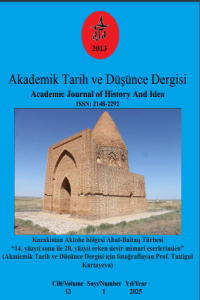Abstract
Təsəvvüfdə və sufinin keçdiyi seyrü-sülukun şərhində ən mühüm məsələlərdən biri məqamlar və hallardır ki, sufi və arif həqiqi kamala və Haqqa çatmaq üçün bu mərhələləri qət etməlidir. Bu hallar onun varlığına daxil olmalı və o, bunlardan bəhrələnməlidir. Oxşar forma irfanda da mövcuddur ki, bunlar artıq mənzil və mərhələlər adlanır. Qeyd etmək lazımdır ki, bu etapları bəzən bab, meydan və s. də adlandırırlar. Salik gərək riyazat mücahidə ilə məqamı əldə etsin. O məqamda qalaraq, onun şərtlərini yerinə yetirsin və bundan sonra digər məqama keçsin. Hal ancaq qeybdən gəlmədir. Bu elə bir davamsız, qısa bir halətdir ki, saikin qəlbinə düşür, işıq kimi parlayır və keçir. Sufilərdə yeddi məqam məşhurdur. Bunlar tövbə, vərə (möminlik), zühd (tərkidünyalıq), fəqr (yoxsulluq), səbr, təvəkkül və rizadır (razılıq, şükr). Digər sufi məqamlarından fərqli olaraq tövbə, vərə, zühd, fəqr, səbr, təvəkkül, riza məqamları və onların əhəmiyyətini Mövlana “Məsnəvi-ye mənəvi” əsərində geniş şəkildə göstərmişdir. Sonralar təriqətdə birləşən sufi və ariflər həmin məqamlardan bəhrələnmişlər. Məhz bu məqamlar Mövləviyyə təriqətində möhkəmlənmiş və bu səbəbdən də biz tədqiqatımızda bu yeddi məqamı “Məsnəvi-ye mənəvi” əsəri əsasında araşdırmağı lazım bilirik.
References
- Alizade, A. (2023). The Character of ʿAlī in the Poems of Nāsir-i Khusraw and Sanā'ī Ghaznavī. Türk Kültürü ve Hacı Bektaş Veli Araştırma Dergisi, (106), 81-108.
- Alizade, A. (2024). Symbolic Flight of the Birds: Exploring the Spiritual Journey From Avicenna’s ʿAyniyyah Eulogy to Navā’ī’s Lisān al-Ṭayr. The Oriental Studies, (94), 189-232. https://doi.org/10.15407/skhodoznavstvo2024.94.189
- Cəlaləddin Rumi. (1372). Məsnəvi-ye mənəvi. Tehran. (In Persian).
- Əkbarabadi ,V. M. (1312). Sharh-e Məsnəvi. Likehnu, Chap-e sangi (In Persian).
- Ənsariyan, H. (1368). Erfan-e eslami. Entesharat-e Peyam-e Azadi, Jeld-e 1.(In Persian).
- Əttar, F. (1341). Mantiq ul-Teyr. Tehran. (In Persian).
- Humayi, C. (1353). Mövləvinamə (Mövləvi che miquyəd) Celdha-ye 1-2 Tehran. (In Persian).
- Kaşani, Ə. M. (1325). Misbah al-Hidaya. Tehran. (In Persian).
- Nikolson, R. (1373). Təsəvvof-e eslami və rabete-ye ensan və xoda. Tehran. (In Persian).
- Qurani-Kərim. (1991). Bakı.
- Qusheyri, Ə. ül-K. (1345). Resale-ye Qusheyriyyə, Tehran. (In Persian).
- Razi, N. (1366). Mirsadul-ibad. Tehran. (In Persian).
- Səccadi, S.C. (1373). Fərhəng-e maaref-e eslami. celd-e 1-3. Tehran. (In Persian).
- Zamani, K. (1373). Shərh-e came-e Məsnəvi-ye mənəvi. Celdha-ye 1-7. Entesharat-e ettelaat. (In Persian).
- Zərrinkub, Ə. (1373). Serr-e ney. Nəqd və shərh-e təhlili və tətbiqi-ye Məsnəvi. celd-e 1-2. Tehran. (In Persian).
Abstract
One of the fundamental aspects of Sufism, particularly in the interpretation of the spiritual journey of a Sufi, concerns the sequential stages and conditions that a seeker and a saint must undergo to attain ultimate perfection and divine Truth. These stages must not only be experienced but also fully internalized. A comparable structure persists in contemporary folk traditions, commonly referred to as "dwelling" or "stage," though alternative terminologies such as "door" or "square" are also employed. The spiritual aspirant must engage in a rigorous struggle to ascend through these stages, fulfilling the requisite conditions of each before progressing further. This journey is not merely confined to the metaphysical realm; rather, it manifests as a transient state that momentarily illuminates the heart and soul before dissipating. Among Sufi traditions, seven key stations are widely recognized: repentance (tawba), piety (wara‘), asceticism (zuhd), poverty (faqr), patience (sabr), reliance on God (tawakkul), and contentment (rida). Unlike conventional classifications of Sufi stages, Jalal al-Din Rumi elucidates these stations—repentance, charity, asceticism, poverty, patience, reliance on God, and contentment—in his seminal work, Masnavī-i Ma‘navī. Subsequent Sufi traditions, particularly the Mawlawi order, have profoundly engaged with and institutionalized these spiritual concepts. Given their centrality in Rumi’s thought, this study seeks to examine these seven stations with a particular focus on their articulation in Masnavī-i Ma‘navī.
Keywords
Jalal al-Din Rumi Masnavī-i Ma‘navī Repentance Piety Asceticism Poverty Patience Reliance on God Contentment
References
- Alizade, A. (2023). The Character of ʿAlī in the Poems of Nāsir-i Khusraw and Sanā'ī Ghaznavī. Türk Kültürü ve Hacı Bektaş Veli Araştırma Dergisi, (106), 81-108.
- Alizade, A. (2024). Symbolic Flight of the Birds: Exploring the Spiritual Journey From Avicenna’s ʿAyniyyah Eulogy to Navā’ī’s Lisān al-Ṭayr. The Oriental Studies, (94), 189-232. https://doi.org/10.15407/skhodoznavstvo2024.94.189
- Cəlaləddin Rumi. (1372). Məsnəvi-ye mənəvi. Tehran. (In Persian).
- Əkbarabadi ,V. M. (1312). Sharh-e Məsnəvi. Likehnu, Chap-e sangi (In Persian).
- Ənsariyan, H. (1368). Erfan-e eslami. Entesharat-e Peyam-e Azadi, Jeld-e 1.(In Persian).
- Əttar, F. (1341). Mantiq ul-Teyr. Tehran. (In Persian).
- Humayi, C. (1353). Mövləvinamə (Mövləvi che miquyəd) Celdha-ye 1-2 Tehran. (In Persian).
- Kaşani, Ə. M. (1325). Misbah al-Hidaya. Tehran. (In Persian).
- Nikolson, R. (1373). Təsəvvof-e eslami və rabete-ye ensan və xoda. Tehran. (In Persian).
- Qurani-Kərim. (1991). Bakı.
- Qusheyri, Ə. ül-K. (1345). Resale-ye Qusheyriyyə, Tehran. (In Persian).
- Razi, N. (1366). Mirsadul-ibad. Tehran. (In Persian).
- Səccadi, S.C. (1373). Fərhəng-e maaref-e eslami. celd-e 1-3. Tehran. (In Persian).
- Zamani, K. (1373). Shərh-e came-e Məsnəvi-ye mənəvi. Celdha-ye 1-7. Entesharat-e ettelaat. (In Persian).
- Zərrinkub, Ə. (1373). Serr-e ney. Nəqd və shərh-e təhlili və tətbiqi-ye Məsnəvi. celd-e 1-2. Tehran. (In Persian).
Details
| Primary Language | Turkish |
|---|---|
| Subjects | Anatolia Language, Literature and Culture |
| Journal Section | Articles |
| Authors | |
| Early Pub Date | March 22, 2025 |
| Publication Date | April 8, 2025 |
| Submission Date | December 5, 2024 |
| Acceptance Date | February 25, 2025 |
| Published in Issue | Year 2025 Volume: 12 Issue: 1 |
По всем вопросам приема статей и выпуска очередных номеров обращаться в редакцию соответствующего журнала


